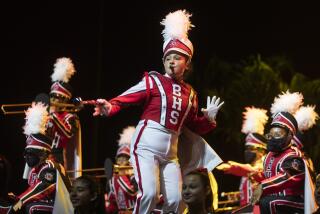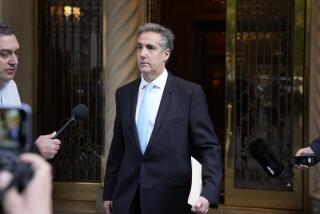Honig Gained Nothing, Accountant Testifies : Education: Defense rests after witness says neither the schools chief nor his wife benefited from state contracts.
- Share via
SACRAMENTO — The defense rested its case Tuesday in the Bill Honig conflict-of-interest trial after presenting a certified public accountant who testified that neither the schools chief nor his wife benefited from contracts that Honig is accused of illegally authorizing.
On the contrary, Francis J. Callahan told a Superior Court jury, the Quality Education Project run by Nancy Honig spent hundreds of thousands of dollars of its own money to augment the contracts that were aimed at developing parental involvement in the public schools.
The prosecution maintains that $337,509 in contracts authorized by Honig between 1986 and 1989 were used to pay local educators to work directly for QEP in developing parental involvement programs. These contracts, prosecutors say, allowed QEP to grow, prosper and pay Nancy Honig an annual salary of about $100,000 by 1989.
The prosecution also maintains that the Honigs benefited by renting office space in their San Francisco home to QEP.
But Callahan, a Bay Area accountant who said he put in 150 hours studying QEP’s books, testified that no Department of Education money flowed to the organization and that QEP had received enough money from donations to pay Nancy Honig’s salary three times over.
Under questioning by defense team attorney Arthur J. Shartsis, Callahan testified that QEP spent at least $600,000 contributed by private donors to help operate the parental involvement projects that four state-paid educators set up in various school districts.
“If these (contracts) had not taken place, they (QEP) would have been $600,000, at least, better off,” said Callahan.
“Did any money flow from the Department of Education to the defendant’s wife?” Shartsis asked.
“No,” responded Callahan.
“Did Bill Honig receive any money either directly or indirectly as a result of the . . . transactions described in the indictment?” asked Shartsis at the conclusion of Callahan’s direct testimony.
“No,” responded the accountant, “he did not receive any money directly or indirectly.”
Under cross-examination, Callahan said that he did not know details of the work performed by any of the educators under contract to the state, nor did he know who supervised their work.
Chief Assistant Atty. Gen. George Williamson sought to show that Callahan knew little about the daily workings of QEP and its relationship to the educators who did parental involvement work.
At one point, however, a Williamson tactic appeared to backfire. Williamson referred to the 150 hours that Callahan said he had spend studying QEP’s books and asked the accountant what he charged per hour.
Callahan responded that he normally charged $225 an hour. But when Williamson pressed him to specify exactly how much he had been paid in the Honig case, he replied:
“I’m only doing this pro bono.”
“You’re doing this for free?” asked Williamson.
“Yes,” replied Callahan.
The accountant was the sixth and final witness in the defense case that began Monday. The prosecution finished its case last week after presenting 20 witnesses.
In earlier testimony Tuesday, the defense put on two character witnesses. Diane Ravitch, a former assistant secretary of education in the Bush Administration, testified that she has known Honig professionally since 1985.
“I would say that Mr. Honig is one of the most honorable, most ethical people I know,” Ravitch testified.
Under cross-examination, Williamson asked her if she would feel the same way if she knew that the state superintendent of public instruction had used state funds on an organization which his wife collected a salary to run.
“I can’t believe that the person I know would do that,” responded Ravitch. “Of course, it would change my opinion.”
Closing arguments are tentatively scheduled for Thursday.
More to Read
Sign up for Essential California
The most important California stories and recommendations in your inbox every morning.
You may occasionally receive promotional content from the Los Angeles Times.












